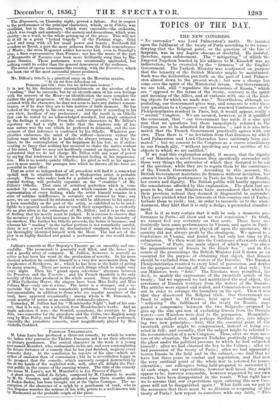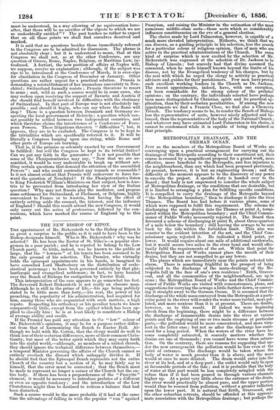TOPICS OF THE DAY.
THE: NEWCONGRESS.
No surrender " was Lord Palmerston's motto. He insisted upon the fulfilment of the treaty of Paris according to its terms denying that the Bolgrad point, or the question of the Isle of Serpents, was in any degree obscure or doubtful. He insisted, therefore, upon enforcement. The " mitigating" of which th.3 Emperor Napoleon boasted in his address to M. Kisseleff was an indiscretion, to be overruled by the " firmness" of the English Government. The Turkish Ministry was readjusted on purpose that the tenacity of the British Minister might be maintained. Such was the declaration put forth on the part of Lord Palmer- ston almost down to the present week ; but now a change has come over the spirit of the Ministerial dream. Our Government, we are told, still " repudiate the pretensions of Russia," which are " opposed to the terms of the treaty, contrary to the spirit and meaning of the Allies, and at variance with one of the lead- ing objects for which we Made war." Nevertheless, although re- pudiating, our Government gives way, and consents to refer these very questions to a Congress—not the renewed Conference of the Plenipotentiaries resident in Paris, but, it would appear, really a " second" Congress. We are assured, however, as if it qualified the concession, that " our Government has made it a sine (lull non that no questions but those immediately referred to the Congress are to be admitted for discussion " • and it is also inti- mated that the French Government practically agrees with our own. Thus there is " no deviation from that firmness by which Lord Palmerston and Lord Clarendon have uniformly been ani-
mated"; we consent to the Congress as a course conciliatory to our rench ally, "without involving any real sacrifice of the objects to which we are entitled."
If we read this explanation :night, it means, that the dignity of our Ministers is saved because they specifically surrender only those very things the surrender of which they declared to be out of the question, while they are to regain them by the connivance of the French Government. According to this account, the. British Government maintains its firmness without deviation, but consents to a little performance in Paris for the benefit of Russia,. her crown and dignity. The British public will hardly appreciate the consolations afforded by this explanation. The plain fact ap- pears to be, that our Ministers have surrendered that which by their previous refusal they deemed it disgraceful to surrender. They have yielded what the interests of this country and of Turkey forbade them to yield ; but, in order to reconcile us to the aban- donment, they hint that it is only a dodge, a pretended abandon- ment.
But is it so very certain that it will be only a dramatic per- formance in Paris—all show and no real concession ? In truth, we cannot feel any certainty on that score. There have un- doubtedly been some performances in Vienna, and again in Paris ; but if some stage-tricks were played off upon the spectators, this country did not always profit by the stratagem. We agreed to a Conference at Vienna, and found we had only lost time by the submission. We then went into the Conference afterwards called " Congress" of Paris, one main object of which was " to abate the preponderance of Russia in the Black Sea " ; and in the course of the proceedings the British Minister laid it down as an essential for the purpose of obtaining that object, that Russia should be excluded from the waters of the Danube. The Russian Plenipotentiaries resorted to every kind of persuasion and device for the purpose of staving off the enforcement of that rule ; but our Ministers were "firm." The Russians were permitted, in- deed, to modify the expressions of the twentieth article of the treaty ; but we supposed we had maintained the real object, the severance of Russian territory from the waters of the Danube. The articles were signed and sealed, and Commissioners were sent out in order to arrange the boundary. on the spot. Then it was- that they discovered the Bolgrad trick. Our Government re- fused to admit it. If France, bent upon " mediating " and " softening " the fulfilment of the treaty for Russia, sug- gested a compromise between the two Bolgrads—proposed to give up the sine qua non of excluding Russia from the Danube waters—our Ministers were deaf to the persuasion. Meanwhile,. France was talked over, and perhaps Sardinia also, into adopt- ing two new principles,—first, that the essential point of the twentieth article might be compromised, instead of being ex- acted in full ; and secondly, that the subject might be referred to the reconsideration of a new Congress. Thus, after we were mas- ters of the situation, the Emperor Nicholas positively yielding up the ghost under the political pressure to which he had subjected himself ; after we had obtained the key to the Crimea ; after we had possession of the treaty of Paris ; after we had apparently beaten Russia in the field and in the cabinet, we find that we have lost three years in combat and negotiation, and that now the very cardinal point of the whole war is referred for recon- sideration ; our colleagues being half-prepared to surrender it ! At each stage, our expectations, however well based they might appear to be, however reasonable, however supported by our own resolve, have been disappointed in the result. What right have we to assume that our expectations upon entering this new Con- gress will not be disappointed again ? What faith can we put in the assurance that there must be no division or reopening of the treaty of Paris ? how repeat to ourselves with any faith, " This
must be understood, in a way allowing of no equivocation here- after, that there will be no sacrifice of the objects to which we are so undoubtedly entitled" ? The past teaches us rather to expect that on all these points we shall find ourselves deceived and mocked.
It is said that no questions besides those immediately referred • to the Congress are to be admitted for discussion. The phrase is not absolutely clear ; but it is understood to mean, that at this Congress we shall not, as at the other Conference, see any question of Greece Rome, Naples, Belgium, or Maritime Law, in- troduced. A fortiori, the new position of affairs at Naples
we suppose, receive no explanation ; although, if the subject was ripe to be introduced at the Conference of March, it is over-ripe for elucidation in the Congress of December or January. Other questions are rather urgent for a practical solution. Prussia is demanding a reestablishment of her anomalous suzerainty in Neu- chatel; Switzerland formally resists ; Prussia threatens to resort to arms ; and, wild as such a course would be in some cases, she may reckon upon receiving the support of Bavaria and Austria if she should find herself involved in difficulties with the obstinacy of Switzerland. In that part of Europe war is not absolutely im- possible ; and should it begin, who can say where the flame will stop ? There is a question between Denmark and Germany re- specting the local government of Holstein ; a question which can- not possibly be settled between two independent countries, and which therefore claims the interference of a Conference of Euro- pean Powers. These litigations threaten " difficulties "; but, it appears, they are to be excluded. The Congress is to be kept to the trivialities which are specifically referred to it. It will be literally a Congress harping upon one string, while Rome and other parts of Europe are burning.
That is, if the promise so solemnly exacted by our Government be fulfilled : but will the Congress be kept to its trivial duties P Can we put any faith in the guarantee ? Is it not possible that some of the Plenipotentiaries may say, " Now that we are as- sembled, it would be very undesirable to break up without set- tling certain questions that demand the attention of the assembled Powers " • and who could contradict any remark so reasonable ? Is it not almost evident that Prussia will endeavour to force for- ward the question of Neuchatel ? If the Plenipotentiaries listen to King Frederick William's Ministers on that subject, how is Aus- tria to be prevented from introducing her view of the Italian question ? Why may not Russia play the mediator, and propose some settlement for Switzerland, or Piedmont, or Belgium, highly convenient to France or to Austria, but having the effect of entirely setting aside the counsel, the interest, and the influence of England ? Should this result attend the new Congress, it would only carry out the series of pretensions, followed by the con- cessions, which have marked the • course of England up to this point.

































 Previous page
Previous page